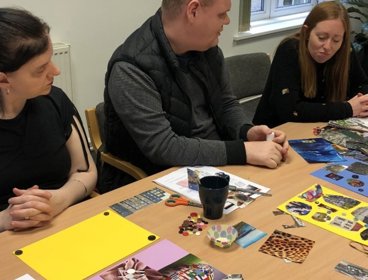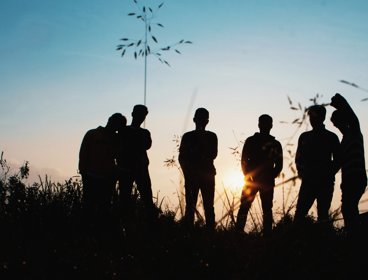By Andrew Williams, Cardiff University
Geographers interested in faith-based welfare seek to unmask and challenge the power dynamics and hierarchies that structure inequalities, and also experiment with and amplify alternative, more just possibilities. Such research can take the form of activism or different forms of collaboration and participation, though it is important to note that much research adopts a mixture of these.
My research on voluntary and faith-based welfare provision has been closely interconnected with my everyday life working as a volunteer in food banks, food coops, and substance misuse and homelessness services. The work is unspectacular, time-intensive, and follows a long-established strand of research that tries to follow the example of ‘slow’, ‘gentle’, and ‘care-full scholarship’ that stays engaged in the lives of participants in a manner that minimises intrusion and prioritises reciprocity and social justice. For many geographers, volunteering offers a mode of participant observation in welfare organisations to study what, how, and why welfare spaces are organised the way they are; to understand the gap between what people say and what happens in practice; and to foreground the voices and experiences of ‘service-users’ that are often marginalised in official narratives.
Engaging with faith-based and other welfare organisations can also bring unconventional insights:
-
Heightened sensitivity to the mundane: choosing to prioritise the messy relational experiences of welfare spaces rather than rushing to tidy categorisations of those involved. This entails giving space for deliberation rather than presuming to know what others believe.
-
Friendship and accountability: sitting and listening to the same people over several years trains the critical lens, refines existing questions, and generates new lines of inquiry. Rather than seeking to ‘capture’ poverty stories as if the researcher is akin to a Pokémon Hunter out to collect ever more rare and elaborate stories of injustice; the researcher seeks to foster mutual relationships of trust and reciprocity with participants whilst recognising the asymmetries and fragility of these relationships.
This is not without its challenges: not least the ethical and moral conflicts that arise when working within faith-based organisations, especially those whose values, policies and procedures deviate from one’s own. There can be difficult conversations about the ethics of care for unwanted proselytisation or more explicit forms of spiritual abuse. When helping manage foodbank centres, one is privy to the behind-the-scenes decisions regarding clientele, stock management, and referral systems. There can be limits on what volunteer-researchers can “make public” due to data confidentiality agreements or sharing information derived from privileged “insider” access, which may betray the trust and sense of reciprocity developed with participants. This raises the question of whistleblowing and the range of strategies researchers can use to address serious problems revealed through their research. For me, this has ranged from difficult one-to-one conversations with staff and volunteers about ‘good practice’, to working with national organisations and regulators to bring awareness and policy change across the sector.
Researchers also adopt more activist positions to disrupt or unsettle existing orthodoxies, perhaps to stimulate ethical reflection among staff and volunteers, or challenge specific policies and procedures; or work collaboratively with others to develop new projects. This has been my experience having been asked to stop running a Trussell Trust foodbank centre after providing food to people who lacked the necessary paperwork to access its services. Hearing the struggles people faced obtaining foodbank vouchers throughout COVID-19 lockdown, in February 2021 a few friends and myself established a food coop based in a drop-in centre that now has over 350 members, ensures access to fresh and unaffordable produce, and unlike the foodbank model does not require referral or voucher.
The commitment to taking care, a research approach which is slow, embodied, and attentive to everyday tensions in terms of friendships and relationships, ultimately shapes what is considered ‘ethical research’ in welfare spaces. Asking someone in a foodbank to recount their experiences of hardship can induce shame by replicating the dynamics of ‘confessional power’ where lived experience is codified by ‘professionals’. This is despite arguments that interview settings provide political space for participants to enact agency in narrating their own story, for instance, naming uncaring encounters and tediously complex processes they have had to navigate with an array of ‘decision-makers’ (e.g. housing office, job centre).
Put plainly, the ‘researcher’ identity can be perceived as just another professional populating foodbank spaces (for example, debt counsellors) with whom they are often, and understandably, reluctant to engage. Irrespective of the ‘sensitivity’ of the interviewer, the research dynamic is part of the emotional scripts demanded in foodbank settings: obligatory gratitude for the foodbank, or finding themselves being steered to reveal (yet again) the deeply personal (and often painful) circumstances that led them to the food bank (and research interview).
Reflecting these concerns, researchers instead choose to immerse themselves in spaces of welfare and advocacy where collaborations with and for people can emerge slowly and on equitable terms. Involvement in voluntary and faith-based welfare provision provides one such route that fosters sensitivity, rapport, and friendship – one where ‘research’ is secondary to just being there. Working at the food coop, I have built a good relationship with several regulars over the years through benefits work, mental health support, organising beach trips, and an informal boxing class. They all know I’m an academic. It has been their conversations that have shaped my research projects: sometimes as consenting and fully anonymised research participants, but most of the time simply wanting to share a story on their own terms that highlights the bureaucratic violence they face in everyday life.
Questions that might guide research practice in this area:
-
In what ways might the choice of research design – and the personal and ethical conflicts faced in research - reflect the way in which researchers are positioned theoretically, religiously, politically, and geographically?
-
What strategies do researchers need to put in place to avoid rose-tinted narratives or sweeping criticisms of faith-based or other welfare organisations?
-
In what ways do researchers of poverty and injustice replicate an intrusive form of ‘confessional power’?
-
What constitutes ‘ethical practice’ working as a volunteer in faith-based and other welfare organisations, especially in those contexts where dynamics of ‘covert/overt’, ‘insider/outsider’ and issues of consent, anonymity, and confidentiality are fraught and constantly being (re)made?
How to cite
Williams, A. (2023) Volunteering in faith-based welfare organisations. Working with voluntary and community groups. Royal Geographical Society (with IBG) Guide. Available at: https://doi.org/10.55203/JEVP7891
About this guide
Working with voluntary and community organisations for some is a very important way to do geography. These organisation come in various shapes and sizes and may also often be referred to as the third sector, the voluntary sector, not-for-profit organisations, community groups or the civic sector. In this guide, we share the experiences of researchers doing geography in collaboration with community and voluntary organisations. A range of topics and issues are explored from health, disability and care, through to austerity, violence, and craft, amongst others. We learn about the approaches taken by geographers in their work with community and voluntary organisations, and some of the challenges they have negotiated in the process.




